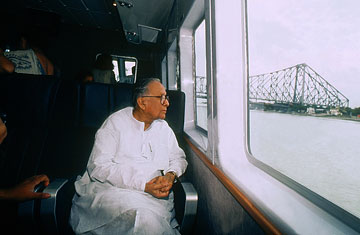
Jyoti Basu, a former Communist Party of India leader, pictured in 1996
In a political career that spanned all of India's 61 years as an independent nation, Jyoti Basu, 95, was the face of India's Communist Party. He was epitome of a certain kind of leftist — urbane, westernized and a skilled power broker — and his death on Jan. 17 has prompted eulogizing from every corner of Indian public life.
Brush aside the flowery tributes, though, and what Basu leaves behind is a party in decline, unable to stand up for the increasingly urgent needs of India's poor. Basu's home state of West Bengal is one of two in India (the other is Kerala) where communists have been a major electoral force since the late 1960s. But while the left in Kerala has been in and out of office, Basu's Communist Party of India (Marxist) has been an unquestioned force in West Bengal for decades. Early in his political career, Basu harnessed the threat of massive strikes to take power — and keep it. A 1970 article in TIME about one particularly bloody wave of Marxist protests in West Bengal concluded: "No one doubts Basu's potential for mayhem."
That street-fighter turned into a powerful administrator. From 1977 to 2000, Basu served as West Bengal's chief minister — the longest-serving state leader in Indian history. He presided over sweeping land reforms, lifting millions of farmers out of poverty. "Transforming one-crop land to multicrop land and providing land to the landless was his greatest contribution," says Mohammed Salim, a colleague of Basu's in government. By the 1980s, West Bengal had gone from a famine-plagued state dependent on food subsidies to a surplus grain producer. "But that's where it all ended," says Rajat Roychowdhury, a political analyst based in Kolkata, West Bengal's capital. Resting on its agrarian reforms, the state became a byword for industrial decay, as its share of India's industrial output fell from 9.8% in 1980 to 5% in 1998. "Basu didn't do anything for industry."
Meanwhile, Basu himself developed a reputation for nepotism. He gave choice land and government contracts to his son's friends and business partners and, in March, his own biographer was named vice chancellor of Calcutta University. Basu never hid his bourgeois tastes — which included a fondness for Scotch and annual trips abroad for health checkups — but critics derided his increasingly lavish, state-sponsored birthday celebrations and Prime Minister–level security detail. The Marxist poet Samar Sen described Basu as "the most well-protected Marxist leader east of the Suez Canal."
The increasingly out-of-touch communists, sensing the state's slipping grip on power, tried to push through a belated industrial expansion by force. In 2007, at least a dozen villagers in Nandigram were killed by state police during protests against the seizure of their land for a chemical plant. In 2008, similar protests pushed Tata Motors to cancel plans to manufacture its $2,500 Nano in the village of Singur, a political debacle that contributed to the communists' severe losses in the 2009 national elections. Basu had retired in 2000, but his high-handed rule left permanent damage, says Tathagata Bhattacharya, a political observer based in New Delhi. "In effect, he made sure that left politics in a democratic framework did not have a future in India."
An armed Maoist insurgency has filled the vacuum, presenting themselves as the true voice of the dispossessed. They have infiltrated villages in pockets throughout the state, and have all but taken control of the village of Lalgarh, less than 125 miles (200 km) away from the state capital of Kolkata. Police and paramilitary forces have struggled for months to subdue the armed guerrillas, already suspected of killing five Communist Party members in 2010 alone. But opposition politician Mamta Banerjee has called the anti-Maoist offensive "a total failure." As mourners greet Basu's funeral procession today in Kolkata, and analysts debate his legacy, the mayhem continues.
